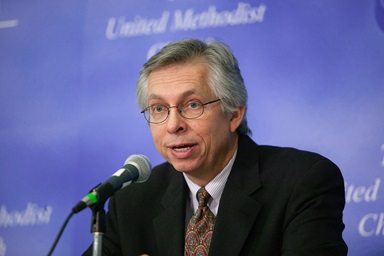Unity begins in baptism
By Sarah Heaner Lancaster
October 25, 2017

Courtesy photo of Sarah Heaner Lancaster.
The unity of the church begins in baptism. When we are made one with Christ, we are also in Christ made one with each other. This is the fundamental unity given to us by God. It is our job to respond to this gift by making our unity in Christ visible to the world.
God has made us one in baptism without wiping away our distinct identities. To acknowledge the way God gives us this gift means acknowledging that diversity and unity belong together. The most visible way we can express unity in the church is to find a way for diverse expressions of faithfulness to exist together in one body.
The uncomfortable thing about this gift is that we do not choose with whom God has united us in Jesus Christ. God’s offer of love and life through baptism extends to all, and the acceptance of that offer is not restricted to people who are acceptable to us. Making God’s offer of love visible to the world requires that widely different individuals be brought together in community.
This requirement means that expressing this unity will never be easy. Diversity can lead to disagreement. Disagreement can lead to division. Division can lead to denying that the group we are dividing from is really Christian or really church. This last possibility sadly has already become reality in the church’s history, and it is the problem the ecumenical movement has been trying to correct for many years.
In the process of reflecting on an already broken church, and looking for ways to make God’s gift of unity visible in it, many ecumenists have turned to a goal called “full communion,” which allows us to formally recognize each other as churches without merging together into a single structure. The full communion agreements that The United Methodist Church has entered into have not required either us or our partners to give up our identities and practices. What they have required is formal recognition of one another as church.
The most important areas through which we show our unity in a formal way are membership, ministry and communion. Do we accept that the members of another church body are members with us in the body of Christ? Do we accept that the ministry of another church body is legitimate ministry in the church of Jesus Christ, even to the extent of the potential to exchange clergy? Are we able to eat at the Lord’s Table together acknowledging that we are one in Jesus Christ?
The United Methodist Church takes unity so seriously that it commits itself to working for “unity at all levels of church life” in Article VI of the Constitution in the Book of Discipline. If The United Methodist Church can enter into agreements with other churches to show unity with them in full communion, should we not be equally committed to unity among ourselves in our current disagreement over LGBTQ issues? Not doing so displays refusal to witness to the gift of unity God has already given us in baptism. Our proper response to God’s gift means finding a way to acknowledge unity in membership, ministry and communion despite differences, and even controversy. In order to do so, we need a structure that allows for diverse expressions of faithfulness but also shows we are one in Christ.
The reason for stretching ourselves to find such a structure is that when we show we can live together despite our differences or in the midst of controversy, we show the world what God can do. Our life together becomes a visible witness to God’s work in Jesus Christ for the sake of the world. If Paul is right in 2 Corinthians 5:18-19 that in reconciling us, God has given us a ministry of reconciliation, then we damage the witness we are called to make if we walk away from one another. We cannot be effective ambassadors for Christ’s reconciling work if we are unwilling to be reconciled. Our divided world is in great need of the ministry that has been entrusted to us. The commitment The United Methodist Church has to unity is an acknowledgement that to be credible, we must show we give ourselves to God’s reconciling work — both to reconcile and to be reconciled.
To carry out this witness, we have to do better in the way we engage each other in disagreement. God can handle our conflict and guide us through it, but we must be willing to open ourselves to the remaking of the Holy Spirit.
To be Christian is to be brought into relationships we did not choose for ourselves, with people who may be very different from us. Our faithfulness to God is reflected in how well we manage to honor the relationships God has brought us into through our baptisms.
Sarah Heaner Lancaster is Werner Professor of Theology at Methodist Theological School in Ohio
Return to the Many Voices, One Faith home page
Like what you're reading? Support the ministry of UM News! Your support ensures the latest denominational news, dynamic stories and informative articles will continue to connect our global community. Make a tax-deductible donation at ResourceUMC.org/GiveUMCom.




